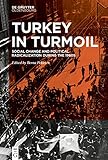Turkey in Turmoil : Social Change and Political Radicalization during the 1960s / ed. by Berna Pekesen.
Material type: TextPublisher: München ; Wien : De Gruyter Oldenbourg, [2020]Copyright date: ©2020Description: 1 online resource (VIII, 331 p.)Content type:
TextPublisher: München ; Wien : De Gruyter Oldenbourg, [2020]Copyright date: ©2020Description: 1 online resource (VIII, 331 p.)Content type: - 9783110650396
- 9783110650754
- 9783110654509
- 943
- DR593
- online - DeGruyter
- Issued also in print.
| Item type | Current library | Call number | URL | Status | Notes | Barcode | |
|---|---|---|---|---|---|---|---|
 eBook
eBook
|
Biblioteca "Angelicum" Pont. Univ. S.Tommaso d'Aquino Nuvola online | online - DeGruyter (Browse shelf(Opens below)) | Online access | Not for loan (Accesso limitato) | Accesso per gli utenti autorizzati / Access for authorized users | (dgr)9783110654509 |
Frontmatter -- Foreword -- Contents -- Introduction -- Social Change and Political Mobilization in the 1960s -- Part I: Social Change: Sources of Radicalization -- Economic Policy and Interest Groups -- Alevis in the 1960s. From Mobility to Mobilization -- “Coca Cola is Poison, Don’t Drink It!” – From Enthusiasm to Hostility: American Consumer Goods, Tourists and Hippies in Cold War Turkey -- Radicalization and/or Reformism in Working Class Politics -- Part II: Rationale and Characteristics of Violence -- From Kemalism to the Armed Struggle: Radicalization of the Left in the 1960s -- Narrating The Enemy: Image and Perception of the “Communists” Among the Radical Right -- Civil War and Massacre in Maraş 1978 -- “Liberated Neighborhoods”: Reconstructing Leftist Activism in the Urban Periphery -- Part III: Symbols, Rituals, Artistic Manifestation -- Shared History, Divided Memory? “1968” in the Narratives of Women Activists -- Objects of Hate? Architectural Symbols of the Rich in Turkey in the 1960s -- Turkey’s “Light” Rock Revolution – Anadolu Pop, Political Music, and the Quest for the Authentic -- Encountering Poverty: Representation of the Gecekondus in Turkish Literature -- Turkey in the 1970s: The Cultural Logic of Factionalism -- List of Contributors -- Index
restricted access online access with authorization star
http://purl.org/coar/access_right/c_16ec
The essays in this book are the first scholarly attempt to examine the complex interrelation of social change and political radicalization during the 1960s. In analyzing topics ranging from the 1968 student uprising, working class politics and trade unionism, Anti-Americanism, right-wing and left-wing militant action, communitarian violence, state coercion, and the artistic representation of these phenomena the contributors offer insights to help to answer why the experiences of this decade turned so radical with lasting polarizing effects on contemporary Turkish society today.Even though issues surrounding the topic are at the very center of intellectual and political debates in today´s Turkey, such as the collective remembrance of the Turkish “68ers” and of the anti-communist state persecution and prosecution after the military intervention in 1980, a cohesive analysis of this era is still strikingly absent in scholarly works. Thus, “Turkey in Turmoil” is unique in many regards. As important as the presented diversity in research perspectives, the volume will also showcase multiple and, at some point, contesting and even provocative perspectives on the subject at hand.
Issued also in print.
Mode of access: Internet via World Wide Web.
In English.
Description based on online resource; title from PDF title page (publisher's Web site, viewed 27. Jan 2023)


